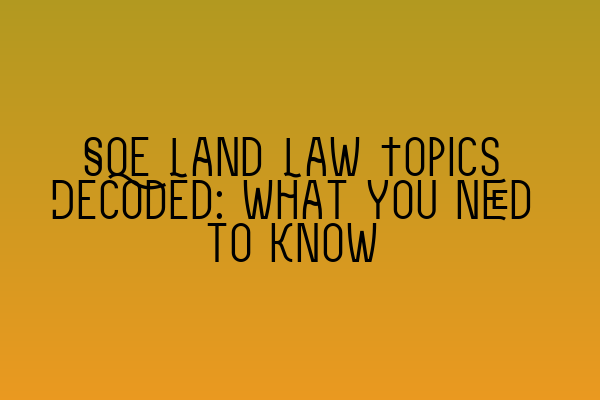SQE Land Law Topics Decoded: What You Need to Know
Welcome to SQE Property Law & Land Law, where we specialize in providing expert legal advice and guidance on all aspects of property and land law. In this blog post, we will delve into the key SQE land law topics that you need to know as a future solicitor. Whether you are preparing for the SQE 1 or SQE 2 exams, understanding these topics is crucial for your success.
1. The Law of Property Act 1925
The Law of Property Act 1925 is a cornerstone of land law in England and Wales. It consolidated and simplified the laws relating to real property, estates, and title to property. It introduced the system of registered land, which allows for the public record of property ownership. Understanding the provisions and implications of this Act is fundamental to practicing property law.
For a deeper understanding of the Law of Property Act 1925, we highly recommend taking our SQE 1 Practice Exam Questions to test your knowledge and proficiency.
2. Freehold and Leasehold Estates
When dealing with land and property, it is essential to distinguish between freehold and leasehold estates. Freehold ownership grants the owner full rights and possession of the land indefinitely, whereas leasehold ownership involves a lease agreement with a specified term. Understanding the rights, obligations, and restrictions associated with these estates is vital in advising clients effectively.
To further develop your understanding of freehold and leasehold estates, we recommend checking out our SQE 1 Practice Mocks FLK1 FLK2 for comprehensive practice.
3. Co-ownership and Trusts of Land
Co-ownership refers to the situation where two or more individuals jointly own a property. It is crucial to understand the different types of co-ownership, such as joint tenancy and tenancy in common, as well as the rights and obligations of co-owners. Additionally, knowledge of trusts of land, which arise when there is an agreement for two or more people to hold property on trust, is essential for property solicitors.
For a comprehensive overview of co-ownership and trusts of land, our SQE 2 Preparation Courses will provide you with the necessary expertise.
4. Land Registration
Land registration is a crucial aspect of land law in England and Wales. The Land Registration Act 2002 governs the registration of title to land and provides for the creation of a unified register. As a future solicitor, you must have a thorough understanding of the registration process, the rights and interests that are capable of being registered, and the importance of conducting searches.
To enhance your knowledge of land registration, explore our dedicated SQE 1 Preparation Courses for in-depth guidance and practice examinations.
5. Easements and Covenants
Easements and covenants are crucial legal concepts in land law. Easements refer to rights granted over someone else’s land, such as a right of way, while covenants are binding promises between landowners. Understanding the creation, enforcement, and termination of easements and covenants is essential for advising clients on their land and property rights.
To stay up to date with the latest developments in easements and covenants, regularly refer to the SRA SQE Exam Dates to ensure you are well-prepared for examination day.
In Conclusion
These are just some of the key land law topics that you need to know as a future solicitor. Understanding the intricacies of property and land law is essential for providing expert advice and guidance to clients in this field. If you are preparing for the SQE exams, we highly recommend taking advantage of our comprehensive preparation resources and courses.
For additional resources and practice, check out our related articles:
- SQE 1 Practice Exam Questions
- SQE 1 Practice Mocks FLK1 FLK2
- SQE 2 Preparation Courses
- SQE 1 Preparation Courses
- SRA SQE Exam Dates
We wish you the best of luck in your SQE exams and future career as a property law and land law solicitor!
